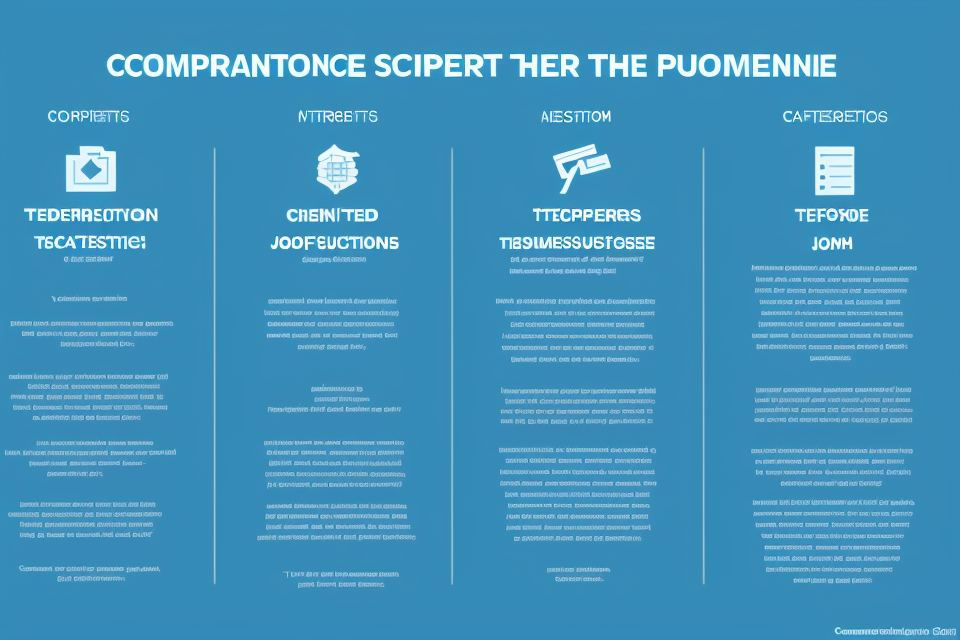
Are you wondering what the difference is between a Computer Science (CS) and Information Technology (IT) degree? Both fields are related to technology, but they have distinct differences in terms of the subjects they cover and the skills they emphasize. A CS degree focuses on the theoretical foundations of computing, including algorithms, data structures, and programming languages. On the other hand, an IT degree is more practical and focused on the application of technology to solve real-world problems. It covers topics such as software development, database management, networking, and cybersecurity. So, if you’re interested in diving deep into the world of coding and computer systems, a CS degree may be the perfect fit for you. But if you’re more interested in using technology to solve business problems and improve efficiency, an IT degree may be the way to go.
A Computer Science (CS) degree focuses on the theoretical and mathematical foundations of computing, including algorithms, data structures, and programming languages. It also covers areas such as software engineering, computer networks, and cybersecurity. On the other hand, an Information Technology (IT) degree is more focused on the practical application of technology to solve business problems. It covers topics such as database management, networking, cloud
What is a Computer Science (CS) Degree?
Core Courses and Concepts
- Algorithms and Data Structures
- Introduction to basic data structures such as arrays, linked lists, stacks, queues, trees, and graphs
- Development of algorithms for solving problems, including sorting, searching, and graph traversal
- Computer Architecture
- Fundamentals of computer hardware, including processors, memory, and input/output devices
- Introduction to computer organization, including assembly language programming and computer architecture concepts such as Von Neumann architecture, pipelining, and parallel processing
- Databases
- Concepts of database management systems, including data modeling, SQL, and database design
- Introduction to data storage, data retrieval, and data manipulation techniques
- Programming Languages
- Study of the fundamentals of programming languages, including syntax, semantics, and pragmatics
- Exposure to different programming paradigms, such as imperative, object-oriented, functional, and concurrent programming
- Introduction to programming language concepts such as compilers, interpreters, and virtual machines.
Career Paths
Software Development
A career in software development is a popular choice for computer science graduates. In this field, individuals design, develop, and maintain software applications and systems. They work with programming languages such as Java, Python, and C++ to create software that meets the needs of users and businesses. With the growing demand for software in various industries, a career in software development can be highly rewarding.
System Administration
System administration is another career path for computer science graduates. System administrators manage and maintain computer systems and networks, ensuring they run smoothly and efficiently. They are responsible for installing and configuring operating systems, managing security, and troubleshooting technical issues. A degree in computer science can provide the necessary skills and knowledge to excel in this field.
Game Development
Game development is a field that combines art and technology, and it is a popular career choice for computer science graduates. Game developers design and create video games for various platforms, such as consoles, PCs, and mobile devices. They use programming languages, game engines, and other tools to bring their creative visions to life. With the gaming industry’s continuous growth, game development is a promising career path for computer science graduates.
Artificial Intelligence
Artificial intelligence (AI) is a rapidly growing field that offers numerous opportunities for computer science graduates. AI professionals design and develop intelligent systems that can learn, reason, and make decisions like humans. They work with machine learning algorithms, data analysis, and natural language processing to create practical applications of AI. A degree in computer science provides the foundation for a career in AI, which is a highly sought-after skill in today’s technology-driven world.
What is an Information Technology (IT) Degree?
An Information Technology (IT) degree is a type of degree that focuses on the use of technology to process, transmit, and store information. This degree program typically covers a wide range of topics, including networking, cybersecurity, cloud computing, and web development.
Networking
Networking is a key component of an IT degree program. It involves the study of how computers and other devices communicate with each other over a network. Students will learn about different types of networks, such as local area networks (LANs) and wide area networks (WANs), as well as network protocols and architecture. They will also learn about network security and how to protect against cyber threats.
Cybersecurity
Cybersecurity is another important aspect of an IT degree program. It involves the study of how to protect computer systems and networks from cyber attacks and data breaches. Students will learn about different types of cyber threats, such as malware, phishing, and ransomware, as well as how to prevent and respond to these threats. They will also learn about encryption, firewalls, and other security measures.
Cloud Computing
Cloud computing is a type of computing that involves the use of remote servers to store, manage, and process data. It is a popular topic in IT degree programs because it has become increasingly important in recent years. Students will learn about different types of cloud computing, such as Infrastructure as a Service (IaaS), Platform as a Service (PaaS), and Software as a Service (SaaS), as well as how to design and implement cloud-based systems.
Web Development
Web development is the process of creating and maintaining websites. It involves the use of programming languages such as HTML, CSS, and JavaScript to create web pages. Students will learn about web design principles, user experience (UX) design, and front-end and back-end development. They will also learn about website hosting, domain names, and other technical aspects of web development.
- Network Administration
- Responsibilities
- Installing and configuring network hardware and software
- Monitoring network performance and troubleshooting issues
- Ensuring network security and compliance with industry standards
- Skills Required
- Strong understanding of networking protocols and technologies
- Experience with network management tools and software
- Familiarity with cybersecurity best practices
- Job Titles
- Network Administrator
- Network Engineer
- Network Security Engineer
- Responsibilities
- Cybersecurity Analyst
– Analyzing and identifying potential security threats to an organization’s network and systems
– Developing and implementing security measures to prevent cyber attacks
– Conducting security audits and investigating security breaches
– Knowledge of security protocols and technologies
– Experience with security analysis tools and software
– Strong problem-solving and critical thinking skills
– Cybersecurity Analyst
– Information Security Analyst
– Security Engineer - IT Project Management
– Planning and coordinating IT projects and initiatives
– Managing project resources and timelines
– Communicating project progress and status to stakeholders
– Strong project management skills
– Knowledge of IT systems and technologies
– Excellent communication and collaboration skills
– IT Project Manager
– IT Program Manager
– IT Project Coordinator - Software Testing
– Designing and executing test plans for software applications
– Identifying and documenting software defects
– Collaborating with developers to resolve software issues
– Knowledge of software development processes and methodologies
– Experience with software testing tools and techniques
– Strong attention to detail and problem-solving skills
– Software Tester
– Quality Assurance Analyst
– Test Engineer
Key Differences
Focus on theoretical computer science vs. practical applications of technology
While both Computer Science (CS) and Information Technology (IT) degrees deal with technology, there is a fundamental difference in their focus. Computer Science degrees are typically more theoretical in nature, with a greater emphasis on algorithms, data structures, and computer systems. They also cover a broader range of topics, including computer programming, database management, and computer security.
On the other hand, IT degrees are more focused on the practical applications of technology. They provide students with a strong foundation in programming and software development, but also delve into systems and infrastructure management. IT degrees are designed to prepare students for careers in fields such as networking, cybersecurity, cloud computing, and software development.
Emphasis on programming and software development vs. systems and infrastructure management
Another key difference between CS and IT degrees is the emphasis they place on different areas of study. Computer Science degrees tend to focus more on programming and software development, while IT degrees place greater emphasis on systems and infrastructure management. This means that CS students are more likely to learn about algorithms and data structures, while IT students are more likely to learn about networking, cybersecurity, and cloud computing.
That being said, there is some overlap between the two fields. Both CS and IT degrees require students to learn programming languages, software development methodologies, and other technical skills. However, the specific courses and coursework may differ depending on the degree program.
CS degrees may cover a broader range of topics, while IT degrees are more focused on specific areas
One final difference between CS and IT degrees is the scope of their curricula. Computer Science degrees tend to cover a broader range of topics, including artificial intelligence, machine learning, computer graphics, and human-computer interaction. These degrees are designed to provide students with a well-rounded education in the field of computer science, preparing them for a wide range of careers.
In contrast, IT degrees are more focused on specific areas of study. They may cover topics such as cybersecurity, cloud computing, and network administration, but in less depth than a CS degree. This means that IT students can specialize in a particular area of interest, such as network security or database management, while still gaining a solid foundation in computer science.
Overall, the key differences between CS and IT degrees lie in their focus and emphasis. CS degrees are more theoretical and cover a broader range of topics, while IT degrees are more practical and focused on specific areas of study.
FAQs
1. What is the difference between a CS and IT degree?
A Computer Science (CS) degree focuses on the theoretical and mathematical foundations of computing, while an Information Technology (IT) degree focuses on the practical application of technology in business and industry. CS graduates are typically prepared for careers in software development, research, and academia, while IT graduates are prepared for careers in IT management, network administration, and other technical roles in business and industry.
2. Are CS and IT degrees similar?
While there are some similarities between CS and IT degrees, they are not identical. CS degrees emphasize programming languages, algorithms, and computer architecture, while IT degrees cover topics such as database management, networking, and software engineering. In addition, CS degrees typically require more mathematics and theoretical computer science courses, while IT degrees often include more business and management courses.
3. Which degree is better for me?
The choice between a CS and IT degree depends on your career goals and interests. If you are interested in software development, research, or academia, a CS degree may be a better fit. If you are interested in business and management, or working in a technical role in industry, an IT degree may be a better choice. Ultimately, the best degree for you will depend on your personal goals and interests.
4. Can I switch between CS and IT degrees?
It is possible to switch between CS and IT degrees, but it will depend on the specific requirements of the program and the university you are attending. Some universities offer joint CS/IT degree programs that allow students to study both disciplines, while others may require you to complete a different degree program altogether. It is best to check with the specific university you are interested in attending to see what options are available.


